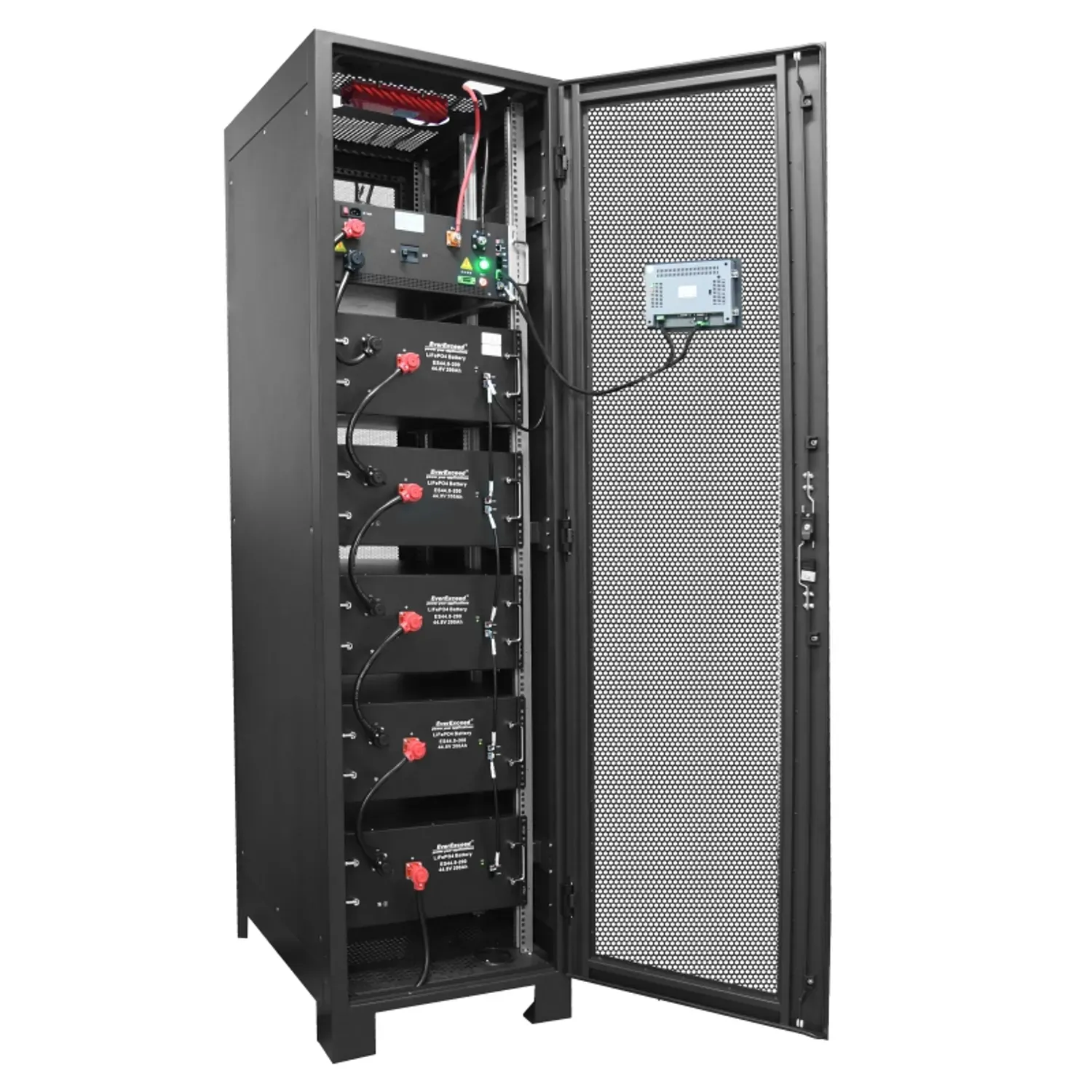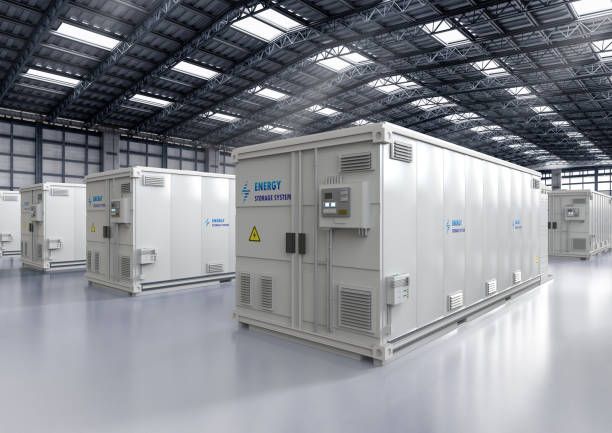
Get a Quote
What is the Difference Between UPS and BESS?
In the world of energy solutions, Uninterruptible Power Supply (UPS) and Battery Energy Storage Systems (BESS)are often compared, but they serve distinct purposes and have key differences. While both systems ensure uninterrupted power during electrical outages, their applications, designs, and technologies vary significantly. This article will explore the differences between BESS vs UPS, focusing on their unique advantages, use cases, and how EverExceed's advanced EverGEN series can support both systems for optimal energy management.
Introduction to Power Solutions: UPS and BESS
What is a UPS (Uninterruptible Power Supply)?
A UPS (Uninterruptible Power Supply) is a device that provides backup power to critical equipment during power outages. It ensures that computers, data centers, and other essential systems remain operational until the main power is restored or a generator kicks in. UPS systems are particularly crucial for environments where even a brief interruption in power can lead to significant data loss or operational disruption.

Key Features of UPS:
- Instantaneous power transfer during outages.
- Protects sensitive electronics from voltage fluctuations.
- Typically includes a smaller battery capacity for short-term use.
- Ideal for applications requiring continuous power for a limited time, such as servers, medical equipment, and communication systems.
Explore EverExceed's EverGEN series for more reliable UPS solutions.
What is a BESS (Battery Energy Storage System)?
A BESS, or Battery Energy Storage System, is designed to store energy for use at a later time. It plays a vital role in energy management, helping to balance supply and demand, integrate renewable energy sources, and improve grid stability. Unlike a UPS, which is primarily a backup power solution, a BESS can store large amounts of energy over long periods and discharge it as needed.
Key Features of BESS:
- Designed for long-term energy storage and high capacity.
- Facilitates load balancing and peak shaving.a
- Often paired with solar or wind energy systems.
- Supports grid stabilization and renewable energy integration.
For large-scale storage solutions, EverExceed's EverGEN series provides cutting-edge BESS technology.
Core Differences Between UPS and BESS
Purpose and Application
The primary difference between UPS and BESS lies in their purpose and application. UPS systems are designed to provide immediate power backup for short durations, ensuring uninterrupted power supply to critical loads. On the other hand, BESS is used for energy storage and management, capable of delivering power over extended periods.
- UPS: Provides immediate power backup for short durations.
- BESS: Stores energy for long-term use and supports grid stabilization.
Duration of Power Supply
UPS systems typically provide power for a short duration, ranging from a few minutes to a couple of hours, depending on the battery capacity. This short-term backup is crucial for maintaining operations during brief outages or until a more reliable power source is activated. BESS, however, can store and discharge energy over several hours or even days, making it suitable for applications like renewable energy integration, peak shaving, and load balancing.
- UPS: Provides power for short durations (minutes to hours).
- BESS: Can store and discharge energy over hours or days.
Energy Capacity
Another key difference between UPS and BESS is their energy capacity. UPS systems are generally designed for lower capacity, enough to keep critical systems running temporarily. BESS, conversely, is built to handle large-scale energy storage, supporting broader applications such as grid stabilization and large renewable energy projects.
- UPS: Lower capacity for temporary use.
- BESS: High capacity for large-scale storage and distribution.
System Components and Design
UPS systems typically consist of batteries, inverters, and control systems specifically designed to switch to battery power instantly when a power interruption is detected. BESS, on the other hand, incorporates more complex components such as advanced battery management systems (BMS), thermal management systems, and often integrates with renewable energy sources like solar or wind.
- UPS: Simple systems designed for immediate power transfer.
- BESS: More complex, often integrating with renewable energy sources and advanced management systems.
Technical Comparison: How Do They Work?
UPS Operation:
A UPS uses an inverter and rectifier to convert and store energy. During an outage, it switches to battery power within milliseconds to prevent interruptions.
BESS Operation:
BESS systems use inverters to convert AC power to DC for storage and back to AC for distribution. They often include sophisticated energy management systems for optimal performance.
UPS vs. BESS: A Comprehensive Comparison
Criteria | UPS | BESS |
|---|---|---|
Purpose | Provides immediate power backup during short-term outages. | Stores energy for long-term use and supports grid stabilization. |
Battery Capacity | Small-scale, suitable for minutes to hours of backup. | Large-scale, suitable for hours to days of energy storage. |
Applications | Critical systems like servers, medical equipment, and data centers. | Renewable energy storage, grid support, and industrial energy needs. |
Integration | Standalone systems with limited expandability. | Can be integrated with renewable energy systems (e.g., solar, wind). |
Technology | Typically uses lead-acid or lithium-ion batteries. | Advanced lithium-ion or flow batteries for scalability and efficiency. |
Advantages of UPS and BESS
Advantages of UPS
- Immediate Power Backup: UPS provides instant power backup, ensuring that critical systems remain operational without interruption.
- Data Protection: It protects against data loss and hardware damage during power outages.
- Power Conditioning: UPS systems can also filter and stabilize the incoming power supply, protecting sensitive equipment from voltage spikes and surges.
Advantages of BESS
- Energy Management: BESS allows for efficient energy management, storing excess energy for use during peak demand periods.
- Renewable Integration: It facilitates the integration of renewable energy sources by storing intermittent energy and supplying it when needed.
- Grid Stability: BESS contributes to grid stability by providing ancillary services such as frequency regulation and voltage support.
Practical Applications of UPS and BESS
Applications of UPS
UPS systems are commonly used in:
- Data Centers: Ensure server and networking uptime.
- Healthcare: Maintain power for life-saving medical equipment.
- Telecommunications: Keep networks active during outages.
- Industrial Automation: Prevent production disruptions in critical systems.
Applications of BESS
BESS finds its applications in:
- Renewable Energy Storage: Store energy from solar, wind, etc.
- Grid Services: Provide peak shaving and load shifting.
- Residential/Commercial Energy Storage: Manage energy use efficiently.
- Electric Vehicles: Support charging stations and EV energy needs.
How to Choose Between UPS and BESS
When deciding between UPS and BESS, consider:
- Application: If you need short-term backup, UPS is ideal. For long-term storage and renewable energy integration, BESS is a better fit.
- Cost and Scalability: UPS is more cost-effective for short-term backup. BESS, although higher upfront, offers better scalability and efficiency in the long run.
Assessing Your Needs
Choosing between UPS and BESS depends on your specific needs and applications. If you require immediate, short-term power backup to protect critical systems, a UPS is the ideal choice. For applications that involve energy storage, management, and long-term power supply, BESS is more suitable.
Evaluating Costs and Benefits
Cost is another factor to consider when choosing between UPS and BESS. UPS systems are generally more cost-effective for short-term power backup solutions. BESS, while often more expensive upfront, provides greater benefits in terms of energy management, long-term storage, and renewable energy integration.
Scalability and Future Needs
Consider the scalability of the system you choose. If your power needs are likely to grow or if you plan to integrate renewable energy sources in the future, a BESS might offer better long-term value. On the other hand, if your primary concern is maintaining uninterrupted power for specific critical systems, a UPS system will be sufficient.
FAQs: UPS and BESS
Can UPS and BESS be used together?
Yes, they can complement each other, with UPS providing instant power and BESS ensuring long-term energy availability.
Which is more cost-effective?
UPS is more cost-effective for short-term applications, while BESS offers better ROI for large-scale or renewable energy integration.
Conclusion
Understanding the differences between UPS vs BESS helps you make an informed decision about your energy needs. For critical short-term power backup, UPS systems are essential, while BESS provides the infrastructure for long-term energy storage, renewable integration, and grid management.
Explore EverExceed's EverGEN Series to find cutting-edge solutions that integrate both UPS and BESS capabilities, offering you the best in energy reliability and efficiency.

